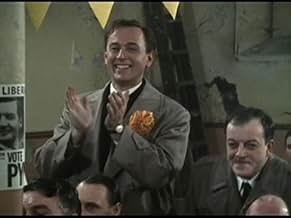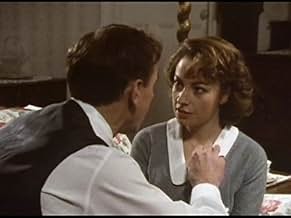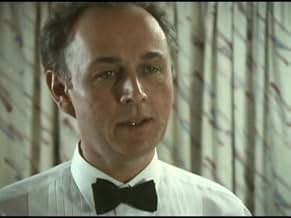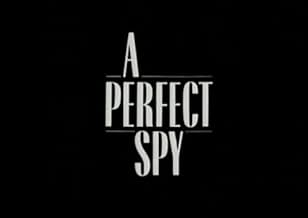A Perfect Spy
- Minissérie de televisão
- 1987
- 6 h 14 min
AVALIAÇÃO DA IMDb
7,3/10
1,1 mil
SUA AVALIAÇÃO
A ascensão e queda de Magnus Pym e sua carreira na inteligência. De encontros casuais com pessoas que serão importantes para ele no futuro a uma vida na Tchecoslováquia, Pym tece seu caminho... Ler tudoA ascensão e queda de Magnus Pym e sua carreira na inteligência. De encontros casuais com pessoas que serão importantes para ele no futuro a uma vida na Tchecoslováquia, Pym tece seu caminho pelo complicado mundo da espionagem.A ascensão e queda de Magnus Pym e sua carreira na inteligência. De encontros casuais com pessoas que serão importantes para ele no futuro a uma vida na Tchecoslováquia, Pym tece seu caminho pelo complicado mundo da espionagem.
- Indicado para 2 Primetime Emmys
- 1 vitória e 6 indicações no total
Explorar episódios
Avaliações em destaque
This is without doubt my favourite Le Carre novel and it is transformed to the silver screen with all the love and care one could wish for. I read a review on this site that seems to find the characters loathsome but I believe this misses the point. All Le Carre stories are essentially love stories and this is no exception. It is an accurate reflection of the period in which it is set. Betrayal is the key by everybody for the good of nobody. Pym upbringing is so close to my own that I find it chilling watching. Peter Egan is in his finest role and the late lamented Ray McAnally is unbelievably good. Even the smallest roles played by such as Andy de la Tour, Tim Healy and Jack Ellis are spot on. This cast is a Theatre Impresario's Dream. The Story should not be spoiled by ill informed description but suffice it to say it relates to a young mans slow but inexorable destruction and descent into espionage and treason. All my sympathies lie with Magnus Pym and his sole (non sexual) love for Poppy (Rüdiger Weigang-as wonderful as always. His only true friendship but also by definition another in the long line of betrayals. OUTSTANDING! Rent it, buy it. love it.
Without doubt the best of the novels of John Le Carre, exquisitely transformed into a classic film. Performances by Peter Egan (Magnus Pym, The Perfect Spy), Rudiger Weigang (Axel, real name Alexander Hampel, Magnus' Czech Intelligence controller), Ray McAnally (Magnus' con-man father) and Alan Howard (Jack Brotherhood, Magnus' mentor, believer and British controller), together with the rest of the characters, are so perfect and natural, the person responsible for casting them should have been given an award. Even the small parts, such as Major Membury, are performed to perfection. It says a lot for the power of the performances, and the strength of the characters in the novel that, despite the duplicity of Magnus, one cannot help but feel closer to Magnus and Axel than to Jack Brotherhood and the slimy Grant Lederer of U.S. Intelligence. I have read the book at least a dozen times, and watched the movie almost as many times, and continue to be mesmerized by both. If I had one book to take on a desert island, A Perfect Spy would be the choice above all others.
There is a brilliant lesson of sorts here about narrative depth, but you must know the book. Lavishly conceived by Le Carre as his magnum opus, the book is not any other spy thriller you picked up on an airport, it's one of the most tantalizing I know. The center is this, a mysterious man, posing as someone else, is holed up in a small room in Dorset overlooking the ocean and recalls a whole journey through life.
The childhood stream-of-consciousness where he attempts to be Faulkner without conquering the madness doesn't work; so much else does. It has a strong sense of presence in several places from Greek islands to Washington, the center of control. It has a sense of anxious premonition about the extents of control. It has a narrator writing a memoir while efforts are underway to apprehend him before he defects to the other side. It has several relationships of ambiguous love defined in his imagination. It has a disappearance in the middle of the night and a strange encounter in a Czech barn.
This, it just won't do.
The most glaring fault by far is that they simplified the structure, making it a linear telling in one go (practically). The childhood segment works even less because when seen, it loses the shroud of memory. Seeing Rick is never going to be as powerful as sensing him move through room's of the son's memory. It still covers most of the narrative ground but we lose the premonition, we lose the mystifying sense of machinery set in motion long ago and discovered only when the ground beneath our feet shifts, we lose the depth of the betrayal of love. We lose it all and get a nicely groomed play. Its idea of profound emotion is actors grimacing in close up; I was stunned to see that it's from the late 80s, it looks 20 years older.
I don't know if this is watchable fiction, maybe it is, but it's a complete catastrophe where it should go beyond it and give us lives, contact, sense, everything Le Carre strove to have it slide through portals of remembrance is reduced to the Cliff notes version.
But something weird happens. To see this and to have known the book is to have images of something I've known as deeper, more elusive, more rending and this, for me, was to recall even the book as deeper than Le Carre managed with words. A powerful scene in the film exemplifies just this, when his wife, alarmed by events, begins to read an unfinished manuscript he's left behind, ostensibly a novel he's writing (he says), but she suspects it's more, we know it's more, it's the disguised recollections of a lifetime (this is completely flattened in this linear telling).
She cries as she reads about betrayal as hope, as salvation, as an adventure for the imaginative soul, but oh how much more maddeningly full is the life behind the words. His wife, his mentor in the service, will they ever truly know? To know this is to realize how much we won't truly know in turn. There's only so much you can say and so easy to misunderstand. What Le Carre doesn't put to words around this life deserves its Tarkovsky film.
The childhood stream-of-consciousness where he attempts to be Faulkner without conquering the madness doesn't work; so much else does. It has a strong sense of presence in several places from Greek islands to Washington, the center of control. It has a sense of anxious premonition about the extents of control. It has a narrator writing a memoir while efforts are underway to apprehend him before he defects to the other side. It has several relationships of ambiguous love defined in his imagination. It has a disappearance in the middle of the night and a strange encounter in a Czech barn.
This, it just won't do.
The most glaring fault by far is that they simplified the structure, making it a linear telling in one go (practically). The childhood segment works even less because when seen, it loses the shroud of memory. Seeing Rick is never going to be as powerful as sensing him move through room's of the son's memory. It still covers most of the narrative ground but we lose the premonition, we lose the mystifying sense of machinery set in motion long ago and discovered only when the ground beneath our feet shifts, we lose the depth of the betrayal of love. We lose it all and get a nicely groomed play. Its idea of profound emotion is actors grimacing in close up; I was stunned to see that it's from the late 80s, it looks 20 years older.
I don't know if this is watchable fiction, maybe it is, but it's a complete catastrophe where it should go beyond it and give us lives, contact, sense, everything Le Carre strove to have it slide through portals of remembrance is reduced to the Cliff notes version.
But something weird happens. To see this and to have known the book is to have images of something I've known as deeper, more elusive, more rending and this, for me, was to recall even the book as deeper than Le Carre managed with words. A powerful scene in the film exemplifies just this, when his wife, alarmed by events, begins to read an unfinished manuscript he's left behind, ostensibly a novel he's writing (he says), but she suspects it's more, we know it's more, it's the disguised recollections of a lifetime (this is completely flattened in this linear telling).
She cries as she reads about betrayal as hope, as salvation, as an adventure for the imaginative soul, but oh how much more maddeningly full is the life behind the words. His wife, his mentor in the service, will they ever truly know? To know this is to realize how much we won't truly know in turn. There's only so much you can say and so easy to misunderstand. What Le Carre doesn't put to words around this life deserves its Tarkovsky film.
As a fan of author John le Carre I've slowly been working my way through both his books and the adaptations of them. I found this 1987 adaptation of le Carre's masterwork at my local library and sat down to watch it thinking I would know what to expect. I was surprised to discover that my expectations were exceeded in this miniseries, a fine cross between a spy thriller and a human drama.
Peter Egan gives a great performance as Magnus Pym, the perfect spy of the title. Carrying on in the long tradition of le Carre's strong main characters, Pym is also quite possibly the best. Egan plays Pym (who in fact contains many shades of author le Carre) as a man forced to spend his entire life lying and betraying sometimes out of circumstance and other times just to survive with the consequence of him becoming "a perfect spy". Egan plays Pym to perfection as a man always on the run, if not from others then from himself. Egan alone makes the six or so hours of this miniseries worth seeing from his performance alone.
Surronding Egan is a fantastic supporting cast. Ray McAnally gives one of his finest performances as Pym's con man father Rick who (as le Carre has said) is based strongly on the author's own father. McAnally plays a man who comes in and out of Pym's life and is one of the those responsible for Pym becoming "a perfect spy". In fact if it wasn't for McAnally's performance a year after this in A Very British Coup this would the finest performance of his sadly too short career.
The rest of the supporting is excellent as well. From Caroline John as Pym's mother to Alan Howard as his spy mentor to Rüdiger Weigang as the young Pym's friend turned controller to Jane Booker as Pym's wife the supporting cast is fantastic. Special mention should be made of the three young actors who played the younger Pym (Jonathan Haley, Nicholas Haley and Benedict Taylor) who establish the young man who would become the man played so well By Peter Egan.
The production values of the miniseries are strong as well. As the miniseries adaptations of Tinker, Tailor, Soldier, Spy and Smiley's People proved these stories can only be told in miniseries format. The locations are excellent from the English locations to the those scattered across Eastern Europe and the USA as are the sets by Chris Edwards. The cinematography of Elmer Cossey adds an extra layer of realism to the world of the miniseries. Yet the highlight of the miniseries is really the script.
Screenwrtier Arthur Hopcraft tackled the job of adapting the six hundred or so page novel excellently. The novel was largely (at least in its early parts) autobiographical in that Pym's early life echoed much of John le Carre's life. The script for this miniseries is no exception as it traces the development of Magnus Pym from young boy to "a perfect spy". Never once does the miniseries deviate from its purpose of telling a fine human drama in the context of the world of espionage. If one ever wants proof that a spy thriller can be tense and fascinating without ever having one gun fight, fist fight, or James Bond style car chase this would be the proof. While the miniseries is six plus hours long it never wastes a moment and it all the better for it.
Though it might be overlong for some for those who don't have very short attention spans here is a must see. From the performances of Peter Egan and Ray McAnally to fine production values and a fine literary script A Perfect Spy is one of the finest miniseries who can expect to see. It is a fascinating trip down the history of the Cold War yet it is more then that. It is also a trip down what John le Carre has called "the secret path": the path of the spy the man who must lie and betray to survive. As much a human drama as a spy thriller A Perfect Spy isn't to be missed.
Peter Egan gives a great performance as Magnus Pym, the perfect spy of the title. Carrying on in the long tradition of le Carre's strong main characters, Pym is also quite possibly the best. Egan plays Pym (who in fact contains many shades of author le Carre) as a man forced to spend his entire life lying and betraying sometimes out of circumstance and other times just to survive with the consequence of him becoming "a perfect spy". Egan plays Pym to perfection as a man always on the run, if not from others then from himself. Egan alone makes the six or so hours of this miniseries worth seeing from his performance alone.
Surronding Egan is a fantastic supporting cast. Ray McAnally gives one of his finest performances as Pym's con man father Rick who (as le Carre has said) is based strongly on the author's own father. McAnally plays a man who comes in and out of Pym's life and is one of the those responsible for Pym becoming "a perfect spy". In fact if it wasn't for McAnally's performance a year after this in A Very British Coup this would the finest performance of his sadly too short career.
The rest of the supporting is excellent as well. From Caroline John as Pym's mother to Alan Howard as his spy mentor to Rüdiger Weigang as the young Pym's friend turned controller to Jane Booker as Pym's wife the supporting cast is fantastic. Special mention should be made of the three young actors who played the younger Pym (Jonathan Haley, Nicholas Haley and Benedict Taylor) who establish the young man who would become the man played so well By Peter Egan.
The production values of the miniseries are strong as well. As the miniseries adaptations of Tinker, Tailor, Soldier, Spy and Smiley's People proved these stories can only be told in miniseries format. The locations are excellent from the English locations to the those scattered across Eastern Europe and the USA as are the sets by Chris Edwards. The cinematography of Elmer Cossey adds an extra layer of realism to the world of the miniseries. Yet the highlight of the miniseries is really the script.
Screenwrtier Arthur Hopcraft tackled the job of adapting the six hundred or so page novel excellently. The novel was largely (at least in its early parts) autobiographical in that Pym's early life echoed much of John le Carre's life. The script for this miniseries is no exception as it traces the development of Magnus Pym from young boy to "a perfect spy". Never once does the miniseries deviate from its purpose of telling a fine human drama in the context of the world of espionage. If one ever wants proof that a spy thriller can be tense and fascinating without ever having one gun fight, fist fight, or James Bond style car chase this would be the proof. While the miniseries is six plus hours long it never wastes a moment and it all the better for it.
Though it might be overlong for some for those who don't have very short attention spans here is a must see. From the performances of Peter Egan and Ray McAnally to fine production values and a fine literary script A Perfect Spy is one of the finest miniseries who can expect to see. It is a fascinating trip down the history of the Cold War yet it is more then that. It is also a trip down what John le Carre has called "the secret path": the path of the spy the man who must lie and betray to survive. As much a human drama as a spy thriller A Perfect Spy isn't to be missed.
It's been a long time since I saw this mini-series and I am happy to say its remembered merits have withstood the test of time.
Most of the components of 'A Perfect Spy', the adaptation of LeCarré's finest novel, in my opinion, are top-drawer. Outstanding aspects of it are the musical score and the masterful screenplay, the latter written by Arthur Hopcraft who was also, I believe, the screenwriter for 'Tinker Tailor Soldier Spy' with Alec Guinness a few years before.
The actors are mostly very good, some superb, like Alan Howard's Jack Brotherhood and Ray McAnally's Ricky Pym. Peter Egan is fascinating to watch because his face changes with every camera angle. The passage of time and the effects upon the physical appearances of the characters is very believably done. So much so that I wondered exactly how old Peter Egan was at the time of filming. The only jolt comes after the character of Magnus Pym is transferred from the very able hands of a young actor named Benedict Taylor to those of a noticeably too-old Peter Egan, just fresh out of Oxford. But this is a minor and unimportant seam in the whole.
Egan has trouble being convincing only when the text becomes melodramatic and he needs to be "upset" emotionally, ie cry. None of the actors have a very easy time with these moments, aside from the wonderful Frances Tomelty who plays Peggy Wentworth for all she's worth and steals the episode with ease.
Jane Booker is annoying as Mary Pym. She has part of the character under her skin but often displays an amateurish petulance that diminishes her as a tough cookie diplomatic housewife, which Mary Pym is. Rüdiger Weigang is splendid as Axel, amusing, ironic and brilliant. I also enjoyed Sarah Badel's camp turn as the Baroness.
The British view of Americans is vividly rendered in some dryly hilarious scenes. When the Yanks have come abroad to confab with Bo Brammell (head of MI6) the American contingent are portrayed as empty-headed buffoons who appear to have memorized a lot of long words out of the Dictionary and spiced them liberally with American jargon and psycho babble, much to the bemused scorn of the English.
The humor and sadness are subtly blended. LeCarré has a knack for mixing disparate elements in his stories and Hopcraft has brilliantly captured the melancholy, yet wistful, atmosphere of the original.
Not a perfect production (what is?) and yet the best of the LeCarré adaptations to reach film or television to date.
Highly recommended to all spy-thriller lovers and especially LeCarré fans. DVD available from Acorn.
Most of the components of 'A Perfect Spy', the adaptation of LeCarré's finest novel, in my opinion, are top-drawer. Outstanding aspects of it are the musical score and the masterful screenplay, the latter written by Arthur Hopcraft who was also, I believe, the screenwriter for 'Tinker Tailor Soldier Spy' with Alec Guinness a few years before.
The actors are mostly very good, some superb, like Alan Howard's Jack Brotherhood and Ray McAnally's Ricky Pym. Peter Egan is fascinating to watch because his face changes with every camera angle. The passage of time and the effects upon the physical appearances of the characters is very believably done. So much so that I wondered exactly how old Peter Egan was at the time of filming. The only jolt comes after the character of Magnus Pym is transferred from the very able hands of a young actor named Benedict Taylor to those of a noticeably too-old Peter Egan, just fresh out of Oxford. But this is a minor and unimportant seam in the whole.
Egan has trouble being convincing only when the text becomes melodramatic and he needs to be "upset" emotionally, ie cry. None of the actors have a very easy time with these moments, aside from the wonderful Frances Tomelty who plays Peggy Wentworth for all she's worth and steals the episode with ease.
Jane Booker is annoying as Mary Pym. She has part of the character under her skin but often displays an amateurish petulance that diminishes her as a tough cookie diplomatic housewife, which Mary Pym is. Rüdiger Weigang is splendid as Axel, amusing, ironic and brilliant. I also enjoyed Sarah Badel's camp turn as the Baroness.
The British view of Americans is vividly rendered in some dryly hilarious scenes. When the Yanks have come abroad to confab with Bo Brammell (head of MI6) the American contingent are portrayed as empty-headed buffoons who appear to have memorized a lot of long words out of the Dictionary and spiced them liberally with American jargon and psycho babble, much to the bemused scorn of the English.
The humor and sadness are subtly blended. LeCarré has a knack for mixing disparate elements in his stories and Hopcraft has brilliantly captured the melancholy, yet wistful, atmosphere of the original.
Not a perfect production (what is?) and yet the best of the LeCarré adaptations to reach film or television to date.
Highly recommended to all spy-thriller lovers and especially LeCarré fans. DVD available from Acorn.
Você sabia?
- CuriosidadesAccording to source novelist John le Carré, the character of Rick Pym (Ray McAnally) is heavily based upon his own father.
- ConexõesFeatured in Wogan: Episode #9.10 (1989)
Principais escolhas
Faça login para avaliar e ver a lista de recomendações personalizadas
- How many seasons does A Perfect Spy have?Fornecido pela Alexa
Detalhes
Contribua para esta página
Sugerir uma alteração ou adicionar conteúdo ausente

Principal brecha
By what name was A Perfect Spy (1987) officially released in India in English?
Responda



































